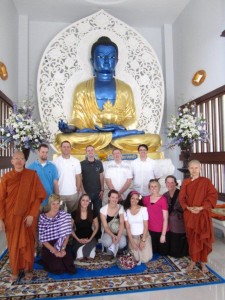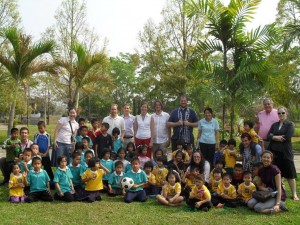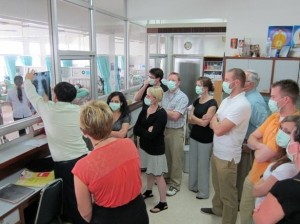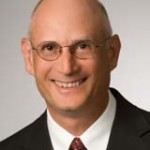University of Utah Thai Clerkship a Life-Changing Experience
Students Find New World of Health Care Halfway Across Globe
“It’s hot and humid. Horns are blaring. The smells, sounds and language are strange. On top of that, these students are exposed to diseases and medical practices that they have never seen,” said Gary Oderda, Pharm.D., MPH, a professor and director at the Pharmacotherapy Outcomes Research Center, University of Utah College of Pharmacy, and co-coordinator of the Thailand clerkship, now in its 16th year. “We definitely take these kids out of their comfort zones.”
The program’s packed itinerary, which is divided primarily between Bangkok and the northern city of Chiang Mai, includes seminars on leprosy, malaria, avian influenza, dengue fever, tuberculosis, AIDS, waterborne illnesses, public health in the developing world, traditional Chinese medicine and herbal remedies, and mosquito abatement. The students encounter challenges rarely seen in the United States, such as how to transport and store vaccines in a hot country where refrigeration is not always available.
Their experiences often provoke discomfort: Students spend a day with patients and caregivers at a leprosy hospital and another in the dengue fever ward of a children’s hospital. They visit an AIDS hospice and an AIDS orphanage, and help out at a school and clinic for Burmese refugees. They learn that Thailand is among the few developing nations that have been relatively effective in stemming the spread of HIV/AIDS on a national scale. And, of course, they learn about the role of pharmacists in the Thai health care system.
Knowledge, But Fewer Resources
According to Dr. Oderda, students are usually surprised to find out that people can walk into a pharmacy and get almost any medication they need without a prescription (with the exception of controlled substances and some malaria drugs). Thai retail pharmacists frequently conduct in-store assessments and make treatment recommendations.
“I didn’t expect pharmacists there to be so involved in patient care at hospitals, or that there would be so many of them,” said Erin Grussendorf, a pharmacy resident at Intermountain Medical Center in Murray, Utah, who participated in last year’s clerkship. “It seemed as though the pharmacists and other health professionals have a high level of knowledge, but they don’t have the resources that we have in the U.S.”
Justin Palfreyman, a pharmacy resident at McKay Dee Hospital in Ogden, Utah, and a veteran of the 2011 clerkship, said he was caught off guard by the magnitude of the differences between the Thai and U.S. health systems. At one hospital, he saw several patients with multidrug-resistant tuberculosis housed in the same room. The windows were open and a few ceiling fans pushed the air in one direction.“That was the only way they had to deal with it. In the U.S., those patients would be isolated in negative pressure rooms,” he said. “It was kind of shocking.”
A “Humbling” Experience
Before going to Thailand, Palfreyman had never left the U.S. The trip “definitely made me more appreciative of our health care system. Even though it has many flaws, I realized that things could be much worse. It is humbling to see some of the situations—like some of the slums—that people live in.”
Of all their experiences, visiting the AIDS orphanage created the deepest and most lasting impression. “The orphanage is what I tell people about most often,” said Grussendorf. “Groups of five or six kids would gravitate to each of us, and we spent a lot of time just playing with them. They seemed so carefree and excited to meet and see new people.”

Students enjoyed side visits to different attractions, including a Buddhist temple.
While the clerkship revolves around medical affairs, it is equally about exposure to new cultures, according to clerkship co-coordinator Elizabeth Young, Pharm.D., BCPS, assistant dean for experiential education. “Students experience a system that is dramatically different from what they’re used to,” she said. “They see how much wealth we have compared to developing nations.”
Often students return to Salt Lake City determined to integrate international health care work into their careers. Dr. Young believes that no matter what career path students pursue, they will take along an augmented ability to communicate with patients from any background. “They’re far more cognizant of the impact of social and economic conditions on health and health care,” she said. “I’m happy with that result.”










 If you want to contribute tutorials, news or other stuff please contact us. We pay 150 for each approved article.
If you want to contribute tutorials, news or other stuff please contact us. We pay 150 for each approved article. Consectetur adipisicing elit. Sed do eiusmod tempor incididunt ut labore.
Consectetur adipisicing elit. Sed do eiusmod tempor incididunt ut labore. This site uses valid HTML and CSS. All content Copyright © 2010 Newscast, Inc
This site uses valid HTML and CSS. All content Copyright © 2010 Newscast, Inc If you like what we do, please don't hestitate and subscribe to our
If you like what we do, please don't hestitate and subscribe to our